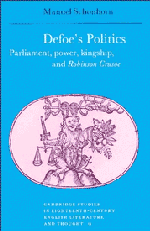Book contents
- Frontmatter
- Contents
- Dedication
- Preface and acknowledgments
- A note on attributions
- List of abbreviations
- Introduction
- 1 Defoe, dissent, and monarchy
- 2 Defoe's Reflections Upon the Late Great Revolution and the political languages of 1689
- 3 Defender of the king, 1689–1701
- 4 From the death of William III to Jure Divino, 1702–1706
- 5 Jure Divino
- 6 The politics of Robinson Crusoe
- Select bibliography
- Index
6 - The politics of Robinson Crusoe
Published online by Cambridge University Press: 19 August 2009
- Frontmatter
- Contents
- Dedication
- Preface and acknowledgments
- A note on attributions
- List of abbreviations
- Introduction
- 1 Defoe, dissent, and monarchy
- 2 Defoe's Reflections Upon the Late Great Revolution and the political languages of 1689
- 3 Defender of the king, 1689–1701
- 4 From the death of William III to Jure Divino, 1702–1706
- 5 Jure Divino
- 6 The politics of Robinson Crusoe
- Select bibliography
- Index
Summary
It was evident to Defoe's eighteenth-century biographers that he was the foremost political pamphleteer of the Revolution, steeped in the knowledge of his country and his time. In 1766 the essayist of the Biographia Britannica wrote that Robinson Crusoe “was the delectable offspring of the teeming brain of Daniel de Foe, a writer famous in his generation for politics and poetry, especially the former.” Though Defoe himself admitted that “Writing upon Trade was the Whore I really doated upon,” even the most conservative bibliography of his printed works would support the contention that politics was the woman he was married to. And the previous chapters have maintained, if proleptically, that The Life and Strange Surprizing Adventures of Robinson Crusoe is a political fable that emanated from an imagination that had been actively engaged in the most intense political debates in modern English history. Yet this assertion of a significant political component to Robinson Crusoe should come as a surprise to the present reader, for given the scholarship of the past fifty odd years, Defoe's great fiction appears to have everything in it but politics. In 1925 Charles Whibley judged it a miracle, not that the Adventures were written, but “that Defoe, the politician, should have recorded them.” Later critics realized that “knowledge of Defoe's political journalism had opened some important windows to his art,” but political considerations rarely penetrated their texts.
- Type
- Chapter
- Information
- Defoe's PoliticsParliament, Power, Kingship and 'Robinson Crusoe', pp. 141 - 164Publisher: Cambridge University PressPrint publication year: 1991

